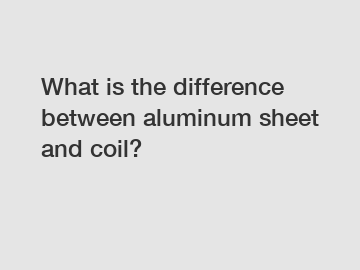What is the difference between aluminum sheet and coil?
What is the Difference Between Aluminum Sheet and Coil?
Aluminum is a versatile material that is used in a wide range of industries due to its excellent properties. It is lightweight, durable, corrosion-resistant, and has excellent thermal and electrical conductivity. Aluminum can be found in various forms, such as sheets, coils, plates, and foils. In this article, we will focus on understanding the difference between aluminum sheet and coil, two commonly used forms of aluminum.
Aluminum Sheet.

---------------------.
Aluminum sheet is a flat, thin piece of aluminum that is often used in applications that require a combination of strength and lightweight properties. It is manufactured by passing an aluminum slab between heavy rollers, an industrial process known as rolling. The rolling process helps to reduce the thickness of the aluminum slab, resulting in a thin and flat sheet.
Aluminum sheets are available in different thicknesses, ranging from a fraction of a millimeter to several millimeters. The thickness of the sheet determines its durability and can vary based on the intended application. Aluminum sheets are used in various industries, such as aerospace, automotive, construction, and electronics, due to their excellent strength-to-weight ratio.
Aluminum Coil.
------------------.
Aluminum coil, on the other hand, is a long, continuous piece of aluminum that is wound into a coil shape. It is also manufactured through the rolling process but tends to be much thinner than aluminum sheets. The coil shape makes it easier to transport and store, as it can be wound and unwound without damaging the aluminum.
Like aluminum sheets, aluminum coils are available in different thicknesses. However, they are generally thinner compared to sheets, with thicknesses ranging from 0.15mm to 5mm. The thinness of the coil allows for efficient heat transfer and makes it suitable for applications such as heat exchangers and condensers.
Uses and Applications.
-----------------------------------.
Both aluminum sheets and coils find applications in a wide range of industries. Aluminum sheets are commonly used in the construction industry for roofing, siding, and insulation purposes. They are also used in the automotive industry for manufacturing body panels and structural components due to their lightweight and rust-resistant properties.
Aluminum coils, on the other hand, are widely used in the HVAC (heating, ventilation, and air conditioning) industry for manufacturing air conditioning units and heat exchangers. The thinness of the coil facilitates efficient heat transfer, making it an excellent choice for these applications. Additionally, aluminum coils are used in the packaging industry for manufacturing food and beverage cans.
Conclusion.
------------------.
In conclusion, aluminum sheets and coils are both versatile forms of aluminum that find applications in various industries. While sheets are thicker and flat, coils are thinner and wound into a coil shape. The choice between using sheets or coils depends on the specific requirements of the application, such as the desired thickness, weight, and heat transfer capabilities.
If you have any further questions or need assistance with aluminum sheets or coils, please do not hesitate to contact us. Our knowledgeable team is here to help you find the right aluminum solution for your needs.
Want more information on china painted aluminium coil for flashings factory, custom aluminium roof coil supplier, Polyester Painted Aluminium Coil supplier? Feel free to contact us.
116
0
0


Comments
All Comments (0)